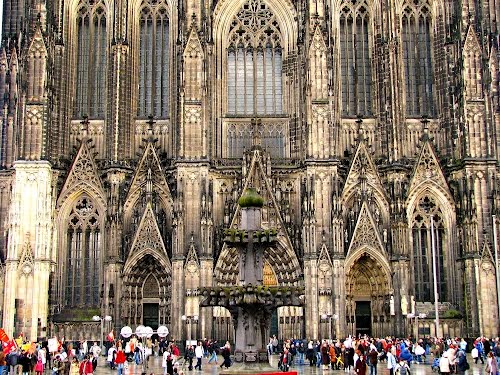Heaven is love without longing.
The nature of Heaven is much-debated. Pearly gates. Golden streets. Harps. Choirs. A pillowy vacation. Light. Pure light.
Daddy dreamed of Heaven at least once. It was a cornfield, so richly green that it was nearly black. The sun touched the tassels on the bursting ears of corn so that the entire picture was one of bounty. A split-rail fence surrounded the field and the mountains rose behind it. Daddy's brother, Hoover, was with him as they approached the fence. They could not enter at the same time, I remember Daddy's saying that. It was a beautiful dream. It comforted Daddy greatly.
My sister Denise dreamed of Heaven, too. She saw her people, our people. They were waiting -- generations, upon generations, begotten, begotten, begotten. She knew them, each one of them, and they knew her.
I have never seen Heaven but I have seen the Cathedral at Cologne.
It was my first trip to Germany. No picture in a text book, no Travel Channel documentary could have prepared me for the Koln Dome:
Cologne Cathedral is a building of superlatives that is the centre and hallmark of this city on the Rhine. The cornerstone of this Gothic cathedral was laid on the Feast of the Assumption of Mary on 15 August 1248. The previous building was apparently no longer deemed impressive enough to house the remains of the Three Wise Men, which Archbishop Rainald von Dassel had brought to Cologne from Milan after the latter city was conquered in 1164. Because of these relics, the cathedral became one of the most important places of pilgrimage in Europe. Its two massive towers have dominated the city’s skyline since their completion in 1880. At 157.38 metres, the northern tower is 7cm taller than the southern one.
Today the cathedral is Cologne’s second-tallest structure, surpassed only by the telecommunications tower. The cathedral covers almost 8,000 square metres of floor space and can hold more than 20,000 people. Due to the building’s impressive Gothic architecture, the shrine of the Three Wise Men, the outstanding stained-glass windows and the many other important works of art, UNESCO declared Cologne Cathedral a World Heritage Site in 1996.
* * * * * * * *
The Primitive Baptist churches of the Appalachian Mountains are distinctive in their plainness. There are no steeples, no crosses, just plain little boxes for people to gather. There is no piano, no organ, just the voices of God's people.
God comes to these meetings. He has been attending as long as the little churches have been there, I think. He pours down like gold into the preacher and it flows over the little congregation. Here, for a moment, there is wholeness, but it is fleeting. The longing returns, the headstones on the hillside just outside the window remind us of the portal, the pearly gate, the gap in the fence, through which we must pass, through which our loved ones have already gone.
Entering the Koln Dome was like walking into the House Made for God. Truly, He lives here, in the faces of the saints, in the tiles on the floor, in the stained glass, the vaulted ceilings, the spires, the towers, the dark spaces underneath. God lives here.
I stood in the back while the Germans gathered for mass. A junior priest, I guess, came over to me and told me in German that I should join the congregants, but I remained on this side of the split rail fence. He was my age if not a little older. Very German -- fair, blonde, ruddy complexion, blue eyes, but there was warmth in his blue eyes. They were not steely blue, but the warm faded blue of worn denim. I shook my head, told him in English that I am not Catholic, that it wouldn't be right. He insisted, in German. I refused, in English. He was perplexed. He did not know exactly what to do with me because he knew I was supposed to be there. He knew he was supposed to be with me.
The organ, the voices, Latin and German -- all rose, pressed against the vaulted ceiling, embraced the saints, unfurled as a Christian banner to touch every stone, every heart of stone.
I wept. I could not hold the melting, and it poured down my face. My priest stood by me, knowing he was appointed to watch over me. He simply stood, his hands clasped in front of him, watching me weep, knowing it was all he could do, knowing it was all he was supposed to do.
I wept over the bones of the Magi, over the haunted souls who sought comfort here for decades, eons, ages. I wept for myself. I wept in gratitude, a gratitude for which I had no words then and have none now.
My priest remembers me, I am sure. I feel his presence. He thinks of the dark-haired American who stood by him and wept and he wonders if I am okay. I want to tell him, yes, yes, yes.
I long to see him again. Perhaps in Heaven.
















